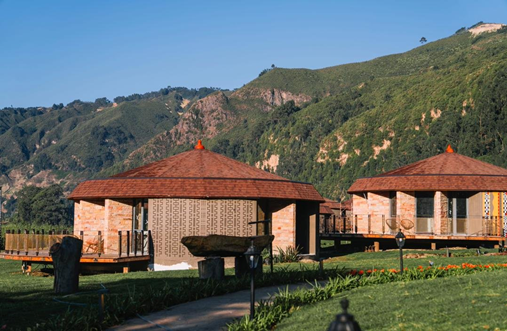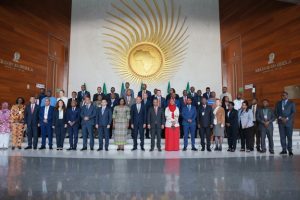
The Wonchi-Dendii Project is an Ethiopian effort that aims to promote sustainable tourism in the Wonchi and Dendii regions, which are noted for their natural beauty, diversified ecosystems, and cultural history. The initiative aims to combine eco-tourism, environmental conservation, and community development.
The project has several purposes. Its principal goal is to provide eco-friendly and sustainable tourist activities that highlight the natural beauty and cultural history of the Wonchi and Dendii regions while reducing negative environmental consequences.

It was built as a part of the expansive tourism destination “Dine for Ethiopia,” which was started in 2021 by Abiy Ahmed (PhD), the prime minister of Ethiopia. The project creates job opportunities for 8,000 to 12,000 people during the building phase of the Wonchi-Dendii Ecotourism Village development. A 72-meter crossing bridge, 35 kilometers of electricity and lighting, and 43 kilometers of access roads make up the extensive infrastructure that has been installed.
It has the potential to conserve the environment since it focuses on conserving and preserving natural ecosystems such as forests, wetlands, and animal habitats to ensure the long-term viability of the region’s natural resources. Additionally, the initiative empowers the local community. The community has been involved in tourism development and conservation activities, creating economic possibilities and allowing residents to have an active role in maintaining their natural environment.
Since its beginning, the project has involved building the trails, visitor centers, and other infrastructure that is required to enable sustainable tourist operations while reducing its negative effects on the ecosystem. More significantly, it works to guarantee the success of sustainable tourist development and environmental conservation initiatives by collaborating with various stakeholders, including local communities, government agencies, non-governmental organizations, and private sector partners. As such, the project is thought to serve as a model for similar initiatives in Ethiopia and other African nations.
According to the Chairperson of the African Union Commission (AUC) Moussa Faki Mahamat, the Wonchi-Dendii Ecotourism Village is an excellent model that other African countries could follow. “Ecotourism is a great opportunity for Africa, he said at the level of the African Union, we are trying to promote tourism in our continent but it should preserve at the same time ecosystem.”
The AUC head emphasized the importance of promoting ecotourism and incorporating the local populace, saying, “So we have to encourage it, and it is a good example to be followed by other African countries.”
California State University professor Alemayehu Gebre Mariam stated that Wonchi-Dendii Ecotourism Village might be Africa’s greatest model. It might serve as a model for Africa by showcasing and combining the environment, culture, and people’s lifestyles.
He said, “I was very impressed by the lake’s location and wonderful natural beauty.” Diasporas who have traveled far from home should learn about their home country’s natural resources and promote them in their communities. Simply seeing this wonderful project has made me realize how much natural beauty Ethiopia possesses.”
The professor, who noted his visits to Chebera Churchura National Park, Gorgora, and other initiatives, underlined the need to conduct comprehensive promotional measures to present such sites to the general public. The lodge’s lush vegetation and stunning position are captivating, and its proximity to Addis Ababa and ease of access allow visitors to come and enjoy, as well as learn about local culture and environmental regulations.
Alemayehu mentioned his familiarity with the local community’s culture during his visit to the lodge, emphasizing that the eco-tourism project provides a consistent source of revenue and showcases Ethiopia’s beauty to the rest of the globe. “Some interest groups are working to ruin Ethiopia’s image and undermine its economy in a coordinated manner, and it is critical to deter these ill-advised efforts by presenting such areas to the world community.
According to him, the Wonchi-Dendii Project demonstrates Ethiopia’s accomplishment in eco-tourism and will play an important role in advancing the tourist sector and replenishing the national income. “Also, this ecotourism project would revitalize business in the area and ensure the benefit of the local community and the ecosystem.”
Italian Ambassador to Ethiopia, Agostino Palese said the village is wonderful with incredible tourism potential. It is a benchmark for all Ethiopians. The area is amazing and the two lakes are nice spots to spend holidays and to meet nature. “It is also something that belongs to the Green Legacy as well, and you can see here the real part of Ethiopia. It is amazing.”
Ambassador Palese elaborated that the project would play a pivotal role in other parts of Ethiopia. “Once you start here, it could be just a drive for other eco-friendly projects like this. You should keep having this space because respect for nature is the most important thing and at the same time joy with nature.”
Also, praising the integration of the community with the village as a good example, he stated that this is the only way to be sustainable because the communities are part of the project and this is a very clever idea. “So, it is a win-win situation both for the government and the community.”
Ethiopian Prime Minister Abiy Ahmed (PhD) remarked, “It is our responsibility to accept the wonderful blessings of nature, care for them, and use them to enrich our lives.” Wonchi has always been a genuine gift from nature. As a result, it is our responsibility to embrace nature’s magnificent benefits, care for them, and use them to improve our lives while preserving the area’s biodiversity.
In general, the Wonchi-Dendii Project, as a whole, represents a holistic approach to assist community development and sustainable tourism in the nation’s Wonchi and Dendii regions while protecting the environment. It’s crucial to remember that the success of the project encourages environmental conservation, which is essential in the battle against climate change. It also demonstrates how the government engages the community, plans effectively, and enforces responsible tourist practices to guarantee that ecosystems and natural resources are preserved for future generations.
Therefore, the government and responsible bodies should encourage additional tourism-related initiatives while also supporting natural environment protection and sustainable management to create a win-win scenario for the government, local community, and environment.
BY EPHREM ANDARGACHEW
THE ETHIOPIAN HERALD SUNDAY EDITION 21 JANUARY 2024





